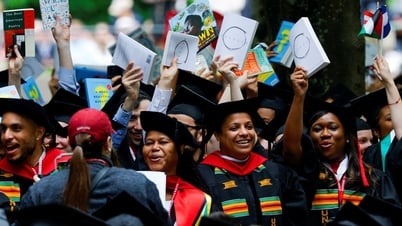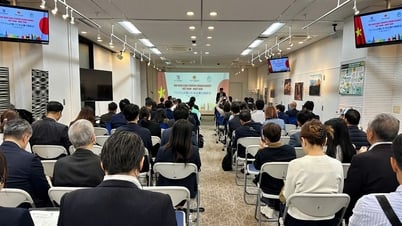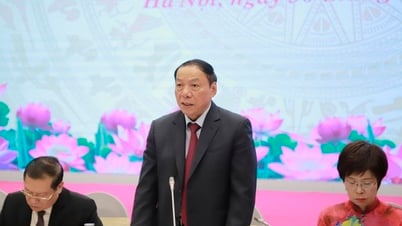Creating an international environment for students
Associate Professor, Dr. Pham Ngoc Thach, Chairman of the Hanoi University Council, said that making English the second language in schools has many challenges.
The first challenge is the human factor, the teaching staff and students have different levels. Next is the requirement for adequate and modern facilities for students to practice English... The survey shows that the biggest difficulty for students is speaking skills.
Dr. Le Anh Duc, Head of Training Management Department, National Economics University, said that “making English a second language” at a university is not simply “teaching English” but is a process of transforming the language system towards academic equality – English goes hand in hand with the mother tongue in all research, teaching and professional communication activities.
 |
Student of National Economics University |
To be considered a second language in schools, English must meet the following conditions: be used as the official language of instruction in part or all of the training program; be used in scientific research and international publications; appear regularly in internal documents, seminars, professional forums, and in university administration tools.
In addition, there needs to be a system of quality assessment, output standards, and training in employability skills on par with other core academic criteria, such as professional competence, critical thinking skills, etc.
"The school determined that it must invest sufficiently, thoroughly, synchronously and systematically so that the National Economics University can become a pioneer in making English the second language in the education system."
Assoc.Prof.Dr. Bui Duc Tho, Chairman of the Board of Directors of National Economics University
Dr. Le Anh Duc proposed that one of the important solutions is to build a comprehensive bilingual academic ecosystem, aiming to build a bilingual academic environment, where teaching materials, learning materials, internal information portals, bulletin boards, learning management systems and communications all have parallel Vietnamese and English versions.
This not only helps learners and lecturers access information conveniently but also creates conditions for the formation of academic language thinking in English naturally.
Experts and educators believe that in order for English to become a second language in schools, there needs to be an environment for students to practice listening, speaking, and communication skills.
If we just stop at the teaching of teachers in the classroom, it is not enough, the important thing is to create an environment for students to use and interact with English every day as a habit. In particular, creating an international learning environment for students, through innovating content and programs to attract international students and prepare domestic students to work in a global environment.
Comprehensive ecosystem investment
Dr. Nguy Thuy Trang, Deputy Head of the Faculty of Foreign Languages of Economics - National Economics University, shared that the EMI model (using English to teach specialized subjects, not related to the language field) is increasingly being applied by many universities around the world as a strategic solution to improve academic competitiveness. EMI is not simply translating textbooks, but a comprehensive structural transformation of the bilingual university model, where English becomes the main tool in teaching, research and administration.
To develop English as the second language at the National Economics University, Dr. Thuy Trang said that the school needs to clearly establish EMI as a pillar in the university development strategy for the period 2025-2035, expressed in specific policy documents.
In the immediate future, it is possible to build a “University-wide EMI Implementation Framework” with the following contents: vision - goals - targets - roadmap - verification mechanism. This framework needs to be accompanied by quantitative assessment indicators such as: EMI course rate by major, qualified lecturer rate, EMI class participation rate, satisfaction level and academic output capacity in English.
“A truly academic environment is a necessary condition for EMI to become part of the fabric of a bilingual university. If English is only present in the classroom, learning will be formal and limited to passive receptive skills.
On the contrary, if learners and teachers operate in a multi-dimensional English-using academic ecosystem - from classrooms, libraries, seminars to extracurricular academic activities - the effectiveness of EMI will be significantly multiplied," said Dr. Trang.
Associate Professor, Dr. Do Anh Duc, Director of the Center for Economic Foreign Languages, proposed promoting the application of information technology and artificial intelligence (AI) to personalize English learning, and having an English proficiency assessment system suitable for each student.
Source: https://tienphong.vn/de-tieng-anh-thanh-ngon-ngu-thu-2-trong-truong-hoc-post1746703.tpo


![[Photo] National Conference "100 years of Vietnamese Revolutionary Press accompanying the glorious cause of the Party and the nation"](https://vphoto.vietnam.vn/thumb/1200x675/vietnam/resource/IMAGE/2025/5/30/1cf6cd5c8a934ebfa347028dcb08358c)
![[Photo] Journalists moved to tears at the Memorial Service for the soldiers who died in Gac Ma](https://vphoto.vietnam.vn/thumb/1200x675/vietnam/resource/IMAGE/2025/5/30/9454613a55c54c16bf8c0efa51883456)
![[Photo] General Secretary To Lam receives Chief of the Central Office of the Lao People's Revolutionary Party](https://vphoto.vietnam.vn/thumb/1200x675/vietnam/resource/IMAGE/2025/5/30/140435f4b39d4599a3d17975dfb444c5)
![[Photo] A delegation of 100 journalists from the Vietnam Journalists Association visits the soldiers and people of Truong Sa island district.](https://vphoto.vietnam.vn/thumb/1200x675/vietnam/resource/IMAGE/2025/5/30/0984a986227d4e988177f560d2e1563e)




![[Video] Announcing the score distribution of the 2025 HSA Competency Assessment exam](https://vphoto.vietnam.vn/thumb/402x226/vietnam/resource/IMAGE/2025/5/30/8f7b551d1e854f02a1873dcbf7f7a9ef)















































































Comment (0)